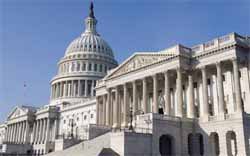Politics
US Senate preparing to define who is a journalist
 In what Internet news giant Matt Drudge says is a direct assault on the First Amendment, the Senate is poised to pass a law defining who they believe is a journalist for purposes of obtaining federal protection in whistleblower cases.
In what Internet news giant Matt Drudge says is a direct assault on the First Amendment, the Senate is poised to pass a law defining who they believe is a journalist for purposes of obtaining federal protection in whistleblower cases.
Earlier this year it was revealed that Eric Holder’s Justice Department was quietly investigating an AP reporter over a government leak that resulted in the publishing of how US intelligence learned that al-Qaeda’s Yemen branch was hoping to launch a spectacular attack using a new, nearly undetectable bomb aboard a US airliner from the anniversary of bin Laden’s death.
Following news of the investigation, the AP strongly protested, arguing that journalists have a First Amendment right to protect their sources. President Obama blamed Congress for the investigation saying it was because they had not passed a strong shield law that would prevent such abuses.
While the Senate was debating a bill lawmakers sparred over who should actually be protected under the bill in the digital age. For example, should a blogger who operates his own news site out of his house be protected?
The Senate panel in a 13 – 5 vote approved a compromise that defined a “covered journalist” as an employee, independent contractor or agent of an entity that disseminates news or information. An individual would need to have been employed for one year within the last 20 years or three months within the last five years to qualify as being a journalist.
The definition would apply to student journalists or someone with a considerable amount of freelance work in the last five years. However, a federal judge would have the discretion to declare a person a “covered journalist” covered under the provisions of law.
While it might appear as if the definition is very broad, news media pioneer Matt Drudge eviscerated the Senate for the definition and singled out Sen. Dianne Feinstein, D-Calif, following comments she made suggesting that only “real reporters” deserved protection under the shield law.
“Comments from Sen. Feinstein yesterday on who’s a reporter were disgusting,” Drudge tweeted, adding that a “17-year old ‘blogger’ is as important as Wolf Blitzer. Fascist”
Drudge went on to note in the subsequent tweet that at one time a federal judge ruled that he was “not a reporter, a journalist, or news gather.” However, new sites all across America visit his site to obtain information on the news of the day. Talk show giant Rush Limbaugh can frequently be seen with a copy of the Drudge Report pulled up on his computer screen.
Ironically, under the new definition a student working for a small college newspaper would get protection, however Drudge and others like him in a new media might not.
“The fundamental issue behind this amendment is, should this privilege apply to anyone, to a 17-year-old who drops out of high school, buys a website for five dollars and starts a blog? Or should it apply to journalists, to reporters, who have bona fide credentials?” Feinstein asked.






